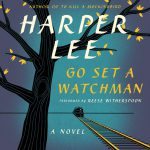*Spoiler Alert*
When late last year I stumbled across the news article that told me a manuscript of an old Harper Lee book had been discovered, I was both thrilled and nervous. I, along with millions of other school children across the world had read – and loved – To Kill A Mockingbird in my teenage years. There are many reasons to love a book like that. I loved that Scout reminded me of me, when I was a young girl. More than that, I loved that it was a book about an ordinary man, Atticus Finch, who fought for justice at great personal cost.
But it was also slightly worrying, that no matter the quality of Go Set A Watchman – the new manuscript – it was almost certainly not going to live up to To Kill A Mockingbird. Add to this that Harper Lee is elderly, and almost totally deaf and blind, and it seemed like a blighted decision to go ahead and publish it.
I preordered the book, of course. Even my trepidation could not stop me reading it. But in the weeks after its release, I watched with dismay as the news headlines in the Arts and Culture sections of newspapers have revealed that instead of being our known and loved justice warrior, Atticus Finch is a racist in this new book. Still, I read on.
First off, an adult Scout (her proper name is Jean Louise) – now 26 years old and on a holiday home from New York City – finds a pamphlet amongst her fathers possessions entitled “The Black Plague” on the dangers of the Negro population. Then she sees him at a Citizens’ Council Meetings where the order of business is the preservation of segregation.
Her sense of betrayal – and mine, for what it’s worth – is palpable.
“The one human being she had ever fully and wholeheartedly trusted had betrayed her… publicly, grossly, and shamelessly” (p. 113).
Scout had, her entire life, unwittingly relied on her father’s integrity.
“She [Scout] did not stand alone, but what stood behind her, the most potent moral force in her life, was the love of her father. She never questioned it, never thought about it, never even realised that before she made any decision of importance the reflex, ‘what would Atticus do?’ passed through her unconscious; she never realised what made her dig in her feet and stand firm whenever she did was her father; that whatever was decent and of good report in her character was put there by her father; she did not know that she worshipped him” (p. 117).
Weirdly, I like that picture. Maybe I like it because it’s not mine, but I think there would be a deep and abiding sense of comfort knowing that you had a model of justice and fairness in your own father. It wouldn’t hurt, I’m sure, if that person also served as a check for all your important life decisions.
After she discovers this shocking truth, she is riddled with anger, and the book culminates in a yelling match between Scout and Atticus. She shoots accusations at him like bullets out of a rifle:
“You’re a coward as well as a snob and a tyrant, Atticus” (p. 247).
“I’ll never forgive you for what you did to me” (p. 248).
And perhaps most cuttingly,
“I believed in you. I looked up to you, Atticus, like I never looked up to anybody in my life and never will again. If you had only given me some hint, if you had only broken your word with me a couple of times, if you had been bad-tempered or impatient with me – if you had been a lesser man, maybe I could have taken what I saw you doing. If once or twice you’d let me catch you doing something vile, then I would have understood yesterday [the Citizens’ Council]” (p. 250).

Even after levelling these accusations, getting them of her chest, the anger in her is still visceral. She marches home with every intention of packing up her things, returning to New York and forgetting all about Atticus and Maycomb County. Until, that is, she talks with her uncle, Dr Finch, who explains to her precisely what’s been going on.
“You, Miss, born with your own conscience, somewhere along the line fastened it like a barnacle onto your father’s. As you grew up, when you were grown, totally unknown to yourself, you confused your father with God. You never saw him as a man with a man’s heart, and a man’s failings – I’ll grant you it may have been hard to see, he makes so few mistakes, but he makes ’em like all of us. You were an emotional cripple, leaning on him, getting the answers from him, assuming that your answers would always be his answers.”
“We wondered, sometimes, when your conscience and his would part company, and over what… Our gods are remote from us, Jean Louise. They must never descend to human level.”
Dr Finch is right, in every way but one.
When we take a human and cast him in the clothes of the divine, we often fail to distinguish that he only looks like God. His conscience is not infallible. He is not perfect. He is not God.
But when God takes his eternal Son, casts him in a human, fleshly body, and sends him to live amongst other humans, this is the true God descending to human level. He is perfect. He is the one with whom we can check our consciences, without fear that he will turn out to be racist like Atticus Finch. He is God.













